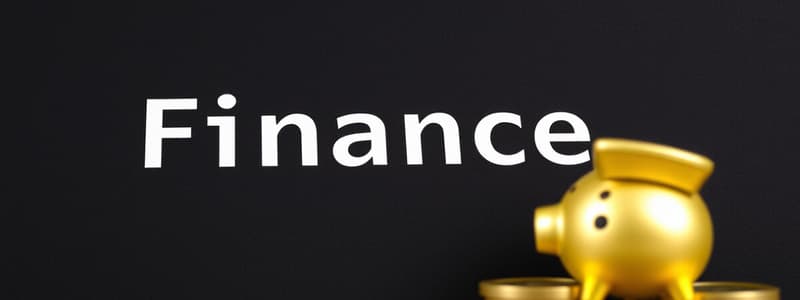Podcast
Questions and Answers
What is a Savings Account?
What is a Savings Account?
- A bank account that earns interest (correct)
- A checking account
- An investment account
- A type of loan
What is Pocket Cash?
What is Pocket Cash?
The amount of money you have in your checking account or in cash that is readily available to spend.
Define Investment.
Define Investment.
The action or process of investing money for profit or material result.
What is an Interest Rate?
What is an Interest Rate?
What is an Emergency Fund?
What is an Emergency Fund?
Define Index Fund.
Define Index Fund.
What is a Certificate of Deposit (CD)?
What is a Certificate of Deposit (CD)?
What is a Maturity Date?
What is a Maturity Date?
Define Stock Market.
Define Stock Market.
What are Stocks?
What are Stocks?
Define Mutual Fund.
Define Mutual Fund.
What is a Portfolio?
What is a Portfolio?
Define Government Bonds.
Define Government Bonds.
What is the Commodities Market?
What is the Commodities Market?
Define Diversification.
Define Diversification.
What is Gold in financial terms?
What is Gold in financial terms?
Flashcards are hidden until you start studying
Study Notes
Banking and Savings
- Savings Account: A bank account designed to earn interest on deposited funds, fostering savings over time.
- Pocket Cash: Immediate cash available for expenditures, sourced from checking accounts or physical cash.
- Emergency Fund: A dedicated savings account for unexpected expenses, ensuring quick access to funds when emergencies arise.
Investments and Financial Instruments
- Investment: The process of allocating money toward assets or ventures with the expectation of generating profit or value.
- Index Fund: A mutual fund designed to replicate the performance of a specific stock or bond index, allowing diversification without selecting individual stocks.
- Certificate of Deposit (CD): A time-bound deposit account that offers a fixed interest rate over a specified duration, typically with penalties for early withdrawal.
- Maturity Date: The set date when the principal amount of an investment, such as a CD or bond, is due for repayment.
Financial Markets
- Stock Market: A marketplace for buying and selling equity in companies, allowing for public investment opportunities.
- Stocks: Units of ownership in a corporation representing a claim on part of the company’s assets and earnings.
- Mutual Fund: An investment vehicle pooling funds from multiple investors to invest in a diversified portfolio of stocks, bonds, and assets.
Risk Management
- Portfolio: A curated collection of an individual's or institution's financial assets, balancing risk and return.
- Government Bonds: Debt securities issued by the government, providing a safe investment option with a promise of repayment plus interest.
- Commodities Market: A marketplace focused on trading commodity futures and contracts, often for basic agricultural or mineral products.
- Diversification: A strategy to spread investments across various asset classes to minimize overall risk and volatility.
Asset Categories
- Gold: A precious metal commonly recognized as a form of currency and investment, often acting as a hedge against inflation.
Studying That Suits You
Use AI to generate personalized quizzes and flashcards to suit your learning preferences.




